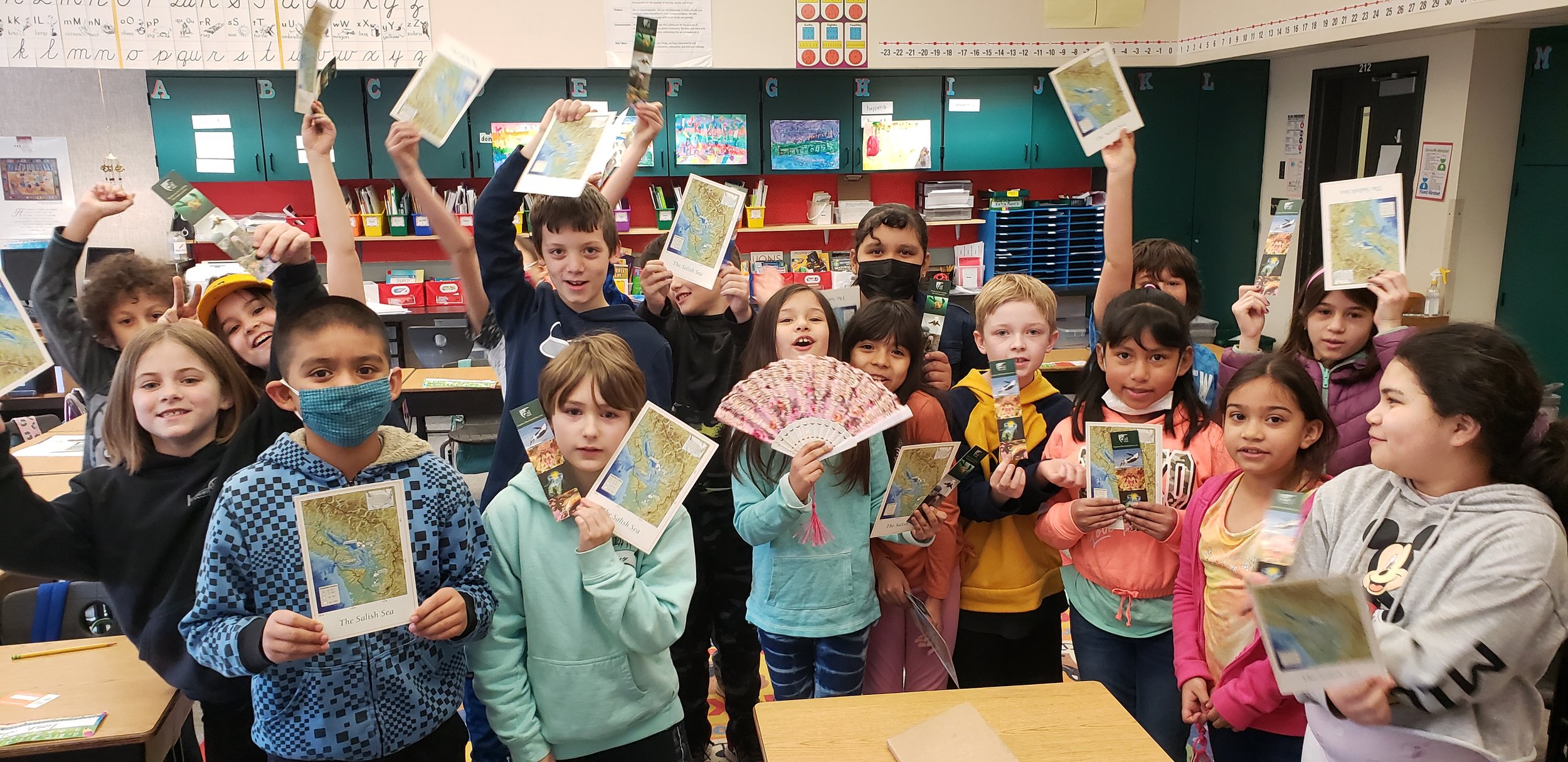When it comes to understanding that we are all connected, the sea, the salmon, the orcas, and humans, Kent Prairie Elementary 4th graders really get it. And they are doing something BIG to keep those connections healthy and strong. Find out what they did last school year to become Salish Sea Heroes!
Read MoreWhat do you get when you cross a sealife-loving Salish Sea Hero with a mysterious, fish-loving canine? Find out in this month’s Friend Feature, written by 9-year-old Layla Cahalan of Orcas Island. You may end up wanting to swim with a sea wolf pup!
Read MoreWith newfound pandemic freedom, more schools than ever headed out into their ecosystems to research and help to restore health to the Salish Sea. This month’s Salish Sea Heroes feature highlights five of these student groups, including over 200 official Salish Sea Heroes, who participated in an international, cross-cultural project to help heal the waterways of their homes in the very heart of the Salish Sea.
Read MoreWe have some BIG news to share in this month’s Friend Feature. Big bodies, big belches, big, well, everything. They can even get into some big trouble when they’re having fun. Explore the feature to find out!
Read MoreThis summer if you are out enjoying nature, clean up garbage as you go. Bring a bag and either gloves or tongs to pick up the garbage. The best part is you can do this practically anywhere. I have even done it while Paddle Boarding. Cleaning up garbage, especially near water sources, is important because it stops it from travelling into our oceans and harming the sea life.
Read MoreHave you ever been by the seaside and heard a puffing pig? What in the world? Find out just who is making these sounds in this month’s Friend Feature.
Read MoreWhat happens when an AWESOME teacher and her super smart students team up with an amazing community partner, like Skagit Fisheries Enhancement Group? Let’s just say it helps 137 wildlfe species. Find out how here!
Read MoreShark-like jet fighters cruise the deep with electric field-sensing technology on board. Find out more about these fascinating (and darn cute) fish!
Read MoreNow that it is spring, try to plant butterfly and bee friendly plants. Bees are endangered and need our help. If you help the bees the bees will help your garden by pollinating. Without bees many of the fruits and vegetables we know would struggle to grow.
Read MoreWhat Salish Sea plant is also an animal, provides shelter, can be eaten like pickles, sprinkled on popcorn, played like a didgeridoo, and played with by orcas? Enter the forest and find out!
Read MoreUse reusable sandwich wraps and metal or glass containers when packing a lunch. If you do have zip-lock bags that you use you can wash and reuse them afterwards.
I do this a lot with school and I hope other people can start doing this too.
It was just another average fish survey for Samish Indian Nation’s Department of Natural Resources crew… until this fish ended up in their survey. What was it and why had they never seen one before? It turns out those are some deep questions.
Read MoreIf you go out on a walk try to collect garbage on the trail or path you are walking on. Bring any sort of bag and either tongs or gloves to pick up the trash. After your walk, simply throw it out. Picking up garbage is a great way to make sure it does not get washed into storm drains or rivers and flow to the ocean.
Read MoreThese downy, white chicks won’t stay small for long. Come explore how these babies bring great hope and encouragement to Salish Sea recovery.
Read MoreTry to use eco-friendly cleaning supplies that don’t test on animals. You can also try to buy refills for your soap bottles so you don’t have to throw them out every time it’s empty.
Read MoreUse [repurpose] brown paper wrapping paper instead of normal wrapping paper you throw out. You can also use reusable gift bags.
Read MoreWhat have we learned from rockfish? First of all, if you’re going to swim slowly and sit still a lot, you better have toxic spines to thwart predators. And second, if humans are going to avoid fishing a species to extinction, we better get to know it really well through science and traditional knowledge. Which requires dive surveys - let’s jump in!
Read MoreWhat is this pretty, little anemone not telling you? Everyone has some things they may not be too proud of, but they don’t likely include consuming someone else’s internal organs.
Read MoreWhen eating fish try to choose the fish that has the Ocean-wise symbol. This means it’s been sustainably caught and is ocean friendly.
Read MoreDo a garbage clean-up at your local beach, river, or park. Cleaning waterways that lead to the ocean stops it [garbage] from going into the sea. Even try to get friends or family to get involved and help.
Read More



















